The Voqal Fellowship is an investment in people as individuals and budding entrepreneurs; a talent accelerator aimed at giving those often overlooked by traditional funders a chance to enact their visions at center stage.
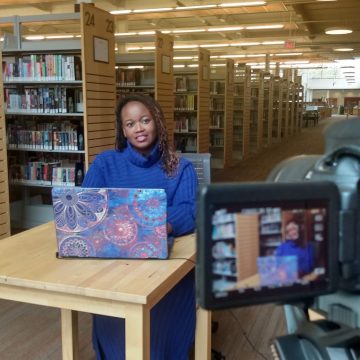
Ini Augustine
Black Internet CooperativeIni Augustine
Black Internet CooperativeA Network Engineer, Ini Augustine (she/her) occupies the space between equity, technology, and art. Her organization to close the digital divide, Project Nandi, was launched in direct response to Covid-19 and the George Floyd protests. She was named Aspiring Businesswoman of the Year for NAWBO Iowa, The National Association of Women Business Owners. Augustine’s commitment to equity and access led her to complete two terms of service as an Americorps volunteer, in Public Allies and Reading Partners. She is also an alum of The Josie R. Johnson Leadership Academy African American Leadership Forum.
Augustine’s project, Black Internet Cooperative, aims to create America’s first black run, fiber-based, cooperatively owned internet service provider. The monopoly that major corporations and telecommunication companies have on broadband has negatively affected families of color during the pandemic. As a result, children of color are, educationally, two to three years behind their white counterparts. This lag is in addition to the systemic educational gap that existed prior to COVID. By gathering input from the impacted communities, she will design an internet carrier that is equitable and accessible for all within the Twin Cities area. As a result, she hopes to close the digital divide and reduce education gaps.
During the George Floyd Uprising, she started Project Nandi to close the digital divide for kids of color. Since May of 2020, it has provided food, laptops, tech support, and resources to 141 BIPOC families. Her project would build on this program to create a community-owned ISP with a Black broadband summit. She wants to gather the community together to heal and have input on the new cooperative ISP and make sure that she reaches the areas that need access to the internet the most.
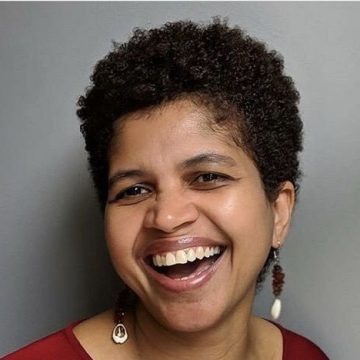
Kiela Smith
Artists Design the Future (ADtF)Kiela Smith
Artists Design the Future (ADtF)Kiela Smith (she/her) is a charismatic servant leader who loves inspiring artists and others while connecting them to resources. She brings grit and street training as a lifelong Chicagoan, 17 years as a teaching artist, and 30 years of professional experience consulting, planning, and creating collaborative community-based mural projects. These experiences combined with her professional network, public speaking, and cross-sector skills make her a valued, capable, and sought-after leader. She earned a Bachelor’s of Fine Arts from The School of the Art Institute of Chicago and has a Master’s Degree in life experience. Being raised in a family of licensed architects and having parents who are former civil rights activists heightened Smith’s awareness of the importance of community development. She recently completed The Rehab Network NFP Community Development and Affordable Housing certificate program to fuel her vision of developing cooperative live/work spaces for artist ownership and entrepreneurial growth. She is committed to making this a reality in her neighborhood and inspiring more of it in her city and nationwide. Her positive, “there is always a solution” attitude makes her an inspiring force!
Smith’s project, Artists Design the Future (ADtF) engages a participatory, grassroots planning process for developing a worker cooperative and idea planning for an art space building that positions citizen artists as investors/owners/stakeholders. The planning process engages charrettes, focus groups, surveys, and interviews as knowledge-rich activities with secondary research further developing that knowledge. The planning process expands community and local leaders’ understanding of the critical value in sustainably integrating local BIPOC artists and art and culture experiences in development effort planning. Cities like New York and Oakland are more successful with the development of shared ownership because of growing investment. Growing Co-ops in Chicago will not financially succeed without civic buy-in.
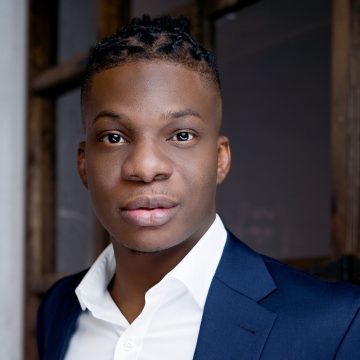
Marq Mitchell
Decarcerate Broward CoalitionMarq Mitchell
Decarcerate Broward CoalitionMarq Mitchell (he/him), founder of Chainless Chainless, is based in Fort Lauderdale, Florida. He is a returning citizen, abolitionist, visionary, and community leader. In addition to being the Lead Strategist for Chainless Change, Mitchell serves on a variety of local and statewide advocacy boards and initiatives related to ending mass incarceration and other systems change efforts. He is a Roddenberry Fellow, Radical Partners Neighborhood Hero, The Sentencing Project’s Race and Justice Award recipient, Broward Young Democrats 2020 “Trailblazer of the Year”, member of New Leaders Council Broward, and Board Member for the Florida Behavioral Health Block Grant Planning Council. Prior to becoming involved in social justice work, he spent years volunteering for local organizations, working to reduce recidivism by providing advocacy and support for at-risk youth and other underserved populations.
Mitchell studied at two colleges, but believes that his most valuable lessons were his personal experiences with being a black man in America, and overcoming the barriers associated with his history of behavioral health conditions, incarceration, and poverty.
Mitchell’s project, Decarcerate Broward Coalition (DBC) is a community-rooted effort in the early stages of development. DBC is made up of local organizing groups and individuals working together to end mass incarceration in South Florida and to increase accountability and transparency with regard to abuse by local correctional institutions and law enforcement. The Coalition envisions a world where the prison industrial complex no longer exists, free of police-sanctioned violence, incarceration, and censorship — where communities are equipped with the resources needed to keep their people safe and healthy.
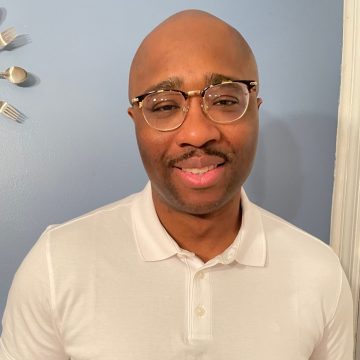
Mattie Abraham
The Prisoner’s Support GroupMattie Abraham
The Prisoner’s Support GroupMattie Abraham (he/him) was born and raised in New Haven by two remarkable women, His grandmother, Mattie Lou Mcfadden, and his mother, Linda Abraham. Despite their greatest efforts to keep him from incarceration, he found himself at 19 years old being sentenced to a thirty-year term. During his incarceration he had the opportunity to link up with some of the dopest prison abolitionists out there. He has been organizing ever since. His advocacy for people incarcerated is rooted in his lived experience as a formerly incarcerated person. He advocates for those who are imprisoned and are enduring trauma after trauma. And he advocates for families who suffer from the violence that the prison space inflicts upon them.
In his free time, he likes to chill, listen to music, create art, and be among family and friends.
Abraham’s project, The Prisoner’s Support Group aims to intervene in the trauma and violence of incarceration. Abraham seeks to build a transformative system of care that prisoners organize. The Prisoner’s Support Group will form a connected network of support groups led by currently and formerly imprisoned people, drawing on approaches to care and support rooted in our lived experience that oppose the criminalizing logics and systems dominating growing industries of re-entry, prisoner rehabilitation, and mental health care. He will develop a community archive and learning tools on surviving and healing from systemic trauma and will use the power of our knowledge and experiences to create responses to crisis and trauma that end the reliance on the prison industrial complex
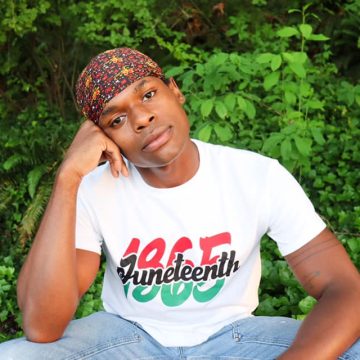
Mu Knowles
Intergenerational Healing Circles: Reclaiming and Sustaining Black and Indigenous OrganizingMu Knowles
Intergenerational Healing Circles: Reclaiming and Sustaining Black and Indigenous OrganizingMu Knowles (they/them) is an Afro-Indigenous trans-non-binary queer liberation steward born and raised in the historically Black Hilltop Neighborhood on Puyallup Tribal Territory (Tacoma, WA). Mu holds a bachelor’s degree in Sociology and Anthropology from the University of Puget Sound where they focused on the study of classificatory and categorical systems within the United States as they relate to power, disenfranchisement, oppression, and inequity. In their Afro-Indigenous Futurist energy work, artistry, scholarship, and creative writing, Knowles acknowledges and reckons with the way in which we approach our shared reality, historiography, and the telling of stories.
Knowles believes Black and Indigenous ancestral wisdom and futuristic visions have been their guiding compass as they reclaim their relational plane. A liberated embodiment is their birthright, to exist, to thrive, to be, unbound and alive. Their heart’s work is rooted in legacies of liberation, seeds of sovereignty, lineages of love, rivers of revolution, havens of holistic healing, and genealogies of justice. Sacred is the path of remembrance. Significant is our interconnection and interdependence. Sustainable are solutions born of great intention. May they be protected as they bring their dreams to fruition.
Knowles’ project, The Intergenerational Healing Circle: Reclaiming and Sustaining Black and Indigenous Organizing is a project that will offer robust, ethical, and sustainable alternatives to settler colonialism and capitalism through in-depth participatory research. This project will allow Black, Brown, and Indigenous stewards, organizers, artists, healers, creators, writers, and storytellers to reclaim autonomy and agency in cocreating the practices, strategies, and solutions that create a more equitable, accessible, and just world for Black, Brown, and Indigenous People. Knowles believes there needs to be more conversation about intra-communal principles, difficulties, values, care, and accountability. They also believe it is so important to cultivate networks that exist outside of capitalism and colonial ways of being, ones that acknowledge historical and contemporary traumas, oppression, and harm that have led to the unsustainable and exploitative world we live in. They assert that in this neoliberal climate it is all the more important to be intentional and not reinvent them. Furthermore, the steps to meaningful relationships are not found in surface-level connections just as growing food/building the infrastructure of regenerative community food systems require deeper work. Sustainable communities are built upon sustainable practices and foundations.
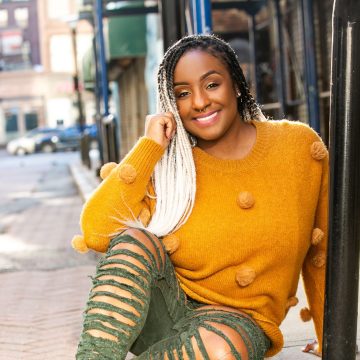
Suzette Burton
Susy Documentary Film and Social Impact CampaignSuzette Burton
Susy Documentary Film and Social Impact CampaignSuzette Burton (she/her) is an award-winning filmmaker and received a B.F.A. in Film/Video from Pratt Institute. She directed the short documentary film “Disconnected” about her father’s mysterious death which premiered at The BAM Theater (Brooklyn Academy of Music) in 2006. Since graduating, she has co-produced the documentary “Daddy Don’t Go” directed by Emily Abt. The film was also executive produced by Omar Epps and Malik Yoba. It aired on the Starz network in 2015 and screened at over 30 film festivals, winning 8 best documentary awards. Burton has also worked as a co-director, producer, cinematographer, and editor for a variety of companies such as Blumhouse Productions, Disarming Films, Unladylike2020, WEtv/AMC Networks, Pureland Pictures, “Little White Lie” (Truth Aid Media), Black Girls Film, Stick Figure Productions, and Karina Sharif. Recently she was an associate producer on the short documentary “Women Who Ride” and co-producer on the feature-length documentary “Interaction Cowboy.” Currently, she is a production coordinator on the documentary “Whitney Houston In Focus” which is directed by Benjamin Alfonsi and executive produced by Audra Mcdonald.
Aside from producing, Burton is directing several projects in development and is the owner of Concrete Dreams Productions L.L.C. She resides in the New York City area and looks forward to directing and producing more films in the future.
Burton’s project, Susy Documentary Film and Social Impact Campaign is a social impact campaign amplifying the growing movement to end hair discrimination in the United States. Anchored by the amplification of cultural narratives, it aims to uplift the historical significance and beauty of Black hair. Susy is on a mission to normalize and illuminate the deep social power of Black hair and to advance the CROWN Act, a policy to end hair discrimination once and for all. The project engages media, research, and community engagement which includes advocacy at the policy level centering on the vision and needs of Black people to be self-determinant members of society.
Implementation of this project will have a significant impact not only on peoples of the Diaspora but also on advancing democratic values at large on a national scale with implications for the global fight against Anti-Blackness and in support of the decolonization of all people. The documentary will be a tool to continue this much-needed advocacy and will question how the U.S. legal system defines race. Brown and black people who feel voiceless and unheard need to start to feel more confident in themselves. Students and work professionals will perform and exceed in educational and work institutions without the obstacle of hair discrimination.
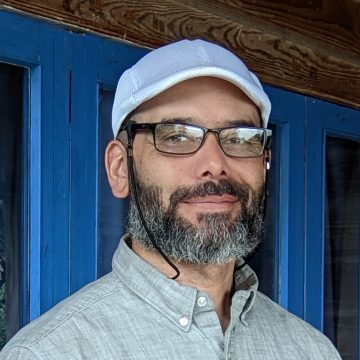
William Isom II
Black in ApplachiaWilliam Isom II
Black in ApplachiaWilliam Isom II (he/him) is a sixth-generation East Tennessean and directs the Black in Appalachia project across seven Appalachian states. He’s the proud father of two boys, Devin and Isa, and has a deep love for the South, the people, food, mountains, and rivers of his home region. Over the years, Isom II has worked at the intersection of media, history, land, and racial justice seeking to develop multi-tiered approaches to life in the Mountain South. He has and continues to work with regional public media outlets, social justice formations, university departments, and a whole bevy of small, locally-specific cultural, social, and religious entities.
Isom II’s project is aimed at developing and implementing a Black-led, cooperative, social entrepreneurship model for a rural field office in Whitesburg, Tennessee. Utilizing a newly purchased building, this project will focus on four pillars for leadership development and base building:
- Next Generation Leadership Development: One of the most significant obstacles in our region is the technical and material support for the current generation of young leaders. Most college and post-college leaders of color that he works with and engages with are seeking viable opportunities to stay in their home communities. This fellowship will focus on those mechanisms that he’s seen to be successful in retaining young talent and movement builders in this project footprint.
- Black Farmer, Small Business, and Landowner Support: Utilizing his physical, rural space, he will develop an information and resources hub for those associated categories in our project footprint. Through ongoing conversations, the need for technical and resource support for this older generation of residents of color has been raised up. He believes that his field office can provide a venue to begin to address that need.
- Rural Communications Infrastructure: This area of focus will lay the organizing groundwork for continual expansion of publicly-owned broadband infrastructure in the area, as well as the establishment of a low-power, Black community-owned radio station at his field office in Whitesburg, Tennessee. The upcoming 2022 FCC community radio licensing window will provide that opportunity to secure space on our public airwaves, serving as a democratic, communications mechanism for his work and others in the region.
- Physical Spaces Preservation: An overlapping material concern is the abandonment and loss of what Dr. William Turner calls, “our stuff.” Physical cultural and social infrastructure, he believes, can provide concrete support for all three previous areas of focus.